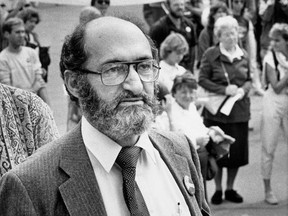While juries are entitled to ignore the law for whatever reason they choose, they should never be invited to do so

Article content
Despite the ultimate finding of guilt against their clients, it would seem the lawyers for three men accused of helping to lead the Coutts border blockade were hoping jurors might ignore the law in the case.
Advertisement 2
Article content
In a written decision posted online following the mischief convictions of Alex Van Herk, Marco Van Huigenbos and Gerhard Janzen, it was revealed defence counsel, in a pretrial motion before their jury trial, wanted to argue for jury nullification of the allegations.
Article content
Simply put, they wanted to be able to inform the Lethbridge jury hearing the trial that despite what the evidence showed, they were free to acquit their clients.
But Court of King’s Bench Justice Keith Yamauchi denied the lawyers’ application, as well as a second motion to allow jurors to pose questions to witnesses.
In his written decision, which could only be publicized after jurors retired to consider their verdict, Yamauchi carefully reviewed the law as it pertained to jury nullification, including a Supreme Court definition of the legal concept.
Article content
Advertisement 3
Article content
“The term ‘jury nullification’ refers to that rare situation where a jury knowingly chooses not to apply the law and acquits a defendant regardless of the strength of the evidence against him,” Yamauchi quoted the nation’s top court.
“Jury nullification is an unusual concept within the criminal law, since it effectively acknowledges that it may occur that the jury elects in the rarest of cases not to apply the law. The explanation seems to be that on some occasions, oppression will result either from a harsh law or from a harsh application of a law.”
Recommended from Editorial
-

Three found guilty of mischief for role in Coutts border blockade
-

Accused ‘appeared to be representing’ group at Coutts border blockade, Mountie tells trial
-

Defence lawyer questions if ’disorganized’ Coutts border protest had anyone in charge
-

Mischief trial begins for three men charged at Coutts border blockade
Advertisement 4
Article content
The most famous case involving the issue of jury nullification was the prosecution of doctors Henry Morgentaler, Leslie Frank Smoling and Robert Scott (the latter two having been alphabetically erased from their place in Canadian history).
The three doctors had opened a clinic to perform what were then illegal abortions in Canada.
Defence counsel in their trial told jurors “it is up to you and you alone to apply the law to this evidence and you have a right to say it shouldn’t be applied.”
The doctors were acquitted, the Ontario Court of Appeal ordered a new trial and ultimately the Supreme Court found the abortion law unconstitutional and found them not guilty.

The comments about jurors’ rights to ignore the law, however, were held to be improper by the top court, Yamauchi noted.
Advertisement 5
Article content
“The Supreme Court of Canada unanimously agreed that the defence counsel’s speech to the jury which amounted to an invitation to engage in jury nullification was an affront to the Anglo-Canadian notion of a trial by jury,” Yamauchi said.
In other words, while juries are entitled to ignore the law for whatever reason they choose, they should never be invited to do so.
Yamauchi pointed to another Supreme Court decision, which quoted an English court judge from 1784, to illustrate that judicial concept.
“It is the duty of the judge, in all cases of general justice, to tell the jury how to do it right, though they have it in their power to do wrong, which is a matter entirely between God and their own consciences.”
Yamauchi said it is the duty of judges and lawyers to explain how to apply the law, not usurp it.
And he added, the concept of jury nullification could cut both ways.
“What if the Crown in the case at bar fails to prove all essential elements of the offence,” he said.
“Can the community, through its jury, say no matter the law what the applicants did was wrong, and they should be convicted of something?”
Ultimately, inviting jurors to ignore the law would urge them to sympathize with a cause rather than consider the cold, hard facts proven in evidence. And that would just be wrong.
Article content









